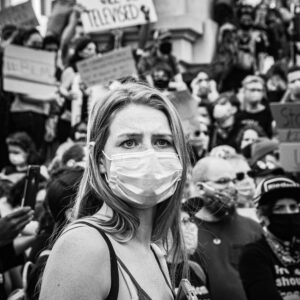If we have learned anything in the past two years, it should be that radical community care is the only thing that can help us in the fight against COVID-19. If the state of Connecticut and Department of Corrections truly valued the lives of incarcerated people in Connecticut, they would immediately end pre-trial incarcerations, and plan for mass releases that prioritize the immunocompromised.
The state’s lack of strategic response to the COVID-19 surge in Connecticut’s prisons is more than disappointing, it is negligent. While the Department of Corrections (DOC) fails to enforce vaccine or mask mandates for prison staff, incarcerated people are subjected to escalated isolation and poor safety protocols. Connecticut’s incarcerated population deserves a comprehensive COVID-19 response that prioritizes mass commuting of sentences, release of all pretrial inmates, and elimination of pretrial incarceration.
Just 11 days into the new year, the DOC issued a press release announcing the deaths of two incarcerated men being held on bond at MacDougall-Walker Correctional Institution. The first victim, a 54 year old man being held on a $650,000 bond since July 2021, had been receiving treatment for three days before he became unresponsive on January 4th and succumbed to his illness at a local hospital. The second, a 67-year-old man being held on a $750,000 bond, passed away on January 9th at the institution’s medical isolation unit after receiving treatment at a local hospital. He had several underlying conditions and was being held pretrial since February 2019.
These two men are the latest of 25 incarcerated people to die due to COVID-19 in Connecticut’s prisons. While Commissioner Quiros offers condolences and laments these entirely preventable deaths as “sad”, he has failed to present or even acknowledge the need for a plan beyond vaccines and regular testing. The fact remains that the Department of Corrections is failing to prioritize the health of the people held captive under their supervision. A 67 year old man with preexisting conditions who contracted COVID-19 should have been an obvious candidate for an immediate compassionate release. Instead, he was held for nearly three years without being convicted of any crime and died without even the comfort of his family and friends.
Unfortunately, his story is not unique. Pre-trial confinement and mass lockdowns are harmful practices that have plagued prisons and jails across Connecticut for years. In the context of a global pandemic, however, these non-solutions often employed by prisons have proven more deadly than normal. The routine practice of incarcerating individuals who have not yet gone to trial or been convicted during a pandemic is especially sinister when one considers the exorbitant bail amounts set for those accused of a crime. These predatory practices prevent the poor black and brown people who fill the state’s prisons from returning home to stay safe from the spikes in COVID-19 cases raging through congregate settings.
Prisons are, by nature, isolating. COVID-19, however, has forced incarcerated people into escalated isolation that proves detrimental to their mental health. Kiarah Pope, who is incarcerated at York Correctional Institution, has been vocal about the many ways that the DOC has failed incarcerated people since the start of the pandemic. With no visits, expensive phone calls, and a surge in cases, the women at York have been placed on 23 hour lock down. For Kiarah and others who live in single-cells, this practice is effectively a stint in solitary confinement.
These measures, while extreme, are certainly not evidence of an abundance of caution on the part of the DOC. When Kiarah did contract the virus in the fall, she had to ask to be tested twice despite being symptomatic and immunocompromised. When she did test positive and joined others in isolation, a guard she had told her fears of being COVID positive remarked “Wow Pope, you really do have COVID”. This lack of care has spilled over into nearly every aspect of COVID-protocol. Kiarah has also been vocal about guards not wearing masks properly or consistently even while punishing incarcerated women for lifting masks to take deep breaths.
While quarantine, mask mandates, vaccines, and booster shots prove to be preventative measures for the general public, those confined to congregate settings need much more proactive and preventative regulations to keep them safe. Institutional lockdowns and isolation of COVID-positive individuals are neither. As of November, the Connecticut Department of Correction had the lowest employee vaccination rate among executive branch state agencies at 65%. Subjecting the incarcerated population to escalated isolation will do nothing to mitigate the spread or impact of COVID-19 when those who supervise them refuse to take the necessary precautions to keep them safe, and continue to prioritize mass incarceration by way of pre-trial captures over health and safety.
If we have learned anything in the past two years, it should be that radical community care is the only thing that can help us in the fight against COVID-19. If the state of Connecticut and Department of Corrections truly valued the lives of incarcerated people in Connecticut, they would immediately end pre-trial incarcerations, and plan for mass releases that prioritize the immunocompromised.
Haddiyyah Ali, 25, is a Connecticut native, mentor, writer, and poet. She co-founded Abolition Ummah, a Muslim-led organization working to improve the material conditions of incarcerated Muslims and fighting for the abolition of prisons and police.






